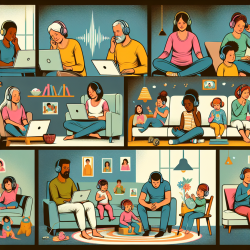The shift to online therapy services during the COVID-19 pandemic has provided valuable insights into how digital platforms can be utilized effectively for therapeutic purposes. A recent study titled "Patient experiences of online psychosexual therapy service during COVID in an NHS health psychology service" sheds light on the experiences of patients who engaged in online psychosexual therapy. While the study focuses on adult patients, its findings are highly relevant for practitioners working with children in the realm of speech-language pathology.
Here, we will discuss how the outcomes of this research can be implemented to improve online therapy services for children, and why further research in this area is crucial for creating great outcomes for young clients.
Key Findings and Their Implications
The study by Pridmore and Langan (2022) presents several key findings that can be applied to online therapy services for children:
- Accessibility: Many patients found online therapy more accessible, which is a significant advantage for children who may have difficulties attending in-person sessions due to geographical or mobility constraints.
- Therapeutic Relationship: Despite the lack of face-to-face contact, patients reported a positive experience with their therapists. This underscores the importance of building a strong therapeutic relationship, even in a virtual setting.
- Resource Preferences: The study highlighted individual differences in resource preferences, suggesting that personalized therapy materials can enhance the effectiveness of online sessions.
- Session Gaps: The gap between sessions allowed patients to practice at home, indicating that providing structured home activities can be beneficial.
Action Points for Practitioners
Based on the findings, here are four actionable steps that practitioners can take to improve online therapy services for children:
- Evaluate Technology: Ensure that the technology used for online therapy is reliable and user-friendly. Technical issues can hinder the therapeutic process, so investing in robust platforms and providing technical support is essential.
- Offer Online Therapy as an Option: Even as face-to-face therapy becomes feasible, continue to offer online therapy as an option. This can accommodate children who may benefit more from virtual sessions.
- Enhance Inclusivity: Strive to make online therapy services inclusive by considering the diverse needs of children. This includes providing materials in different formats and ensuring accessibility for children with disabilities.
- Provide Engaging Resources: Develop resources that encourage active participation and normalize the therapy process. Interactive and visually appealing materials can keep children engaged and motivated.
The Importance of Further Research
While the study provides promising results, further research is needed to explore the specific needs and experiences of children in online therapy settings. This can help in:
- Identifying the most effective therapeutic techniques for online sessions.
- Understanding the long-term impact of online therapy on children's development.
- Developing guidelines for best practices in online speech-language pathology.
Encouraging practitioners to engage in or support research initiatives can lead to data-driven improvements in therapy services, ultimately benefiting the children they serve.
Conclusion
The transition to online therapy has opened new avenues for providing effective therapeutic services. By implementing the insights from recent research and continuing to explore this area, practitioners can enhance their skills and create better outcomes for children. For those interested in delving deeper into the research, you can read the original paper here: Patient experiences of online psychosexual therapy service during covid in an nhs health psychology service.










